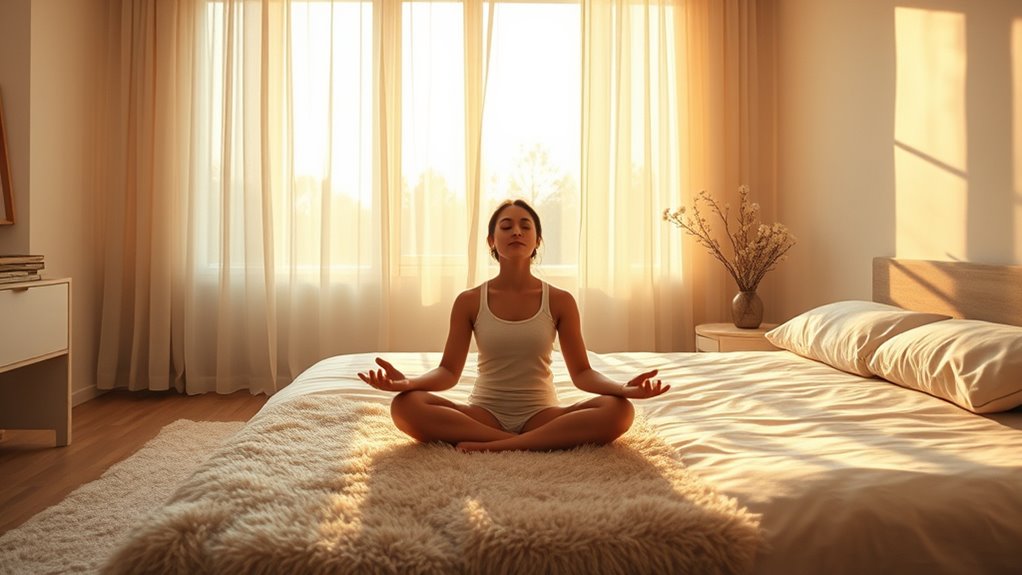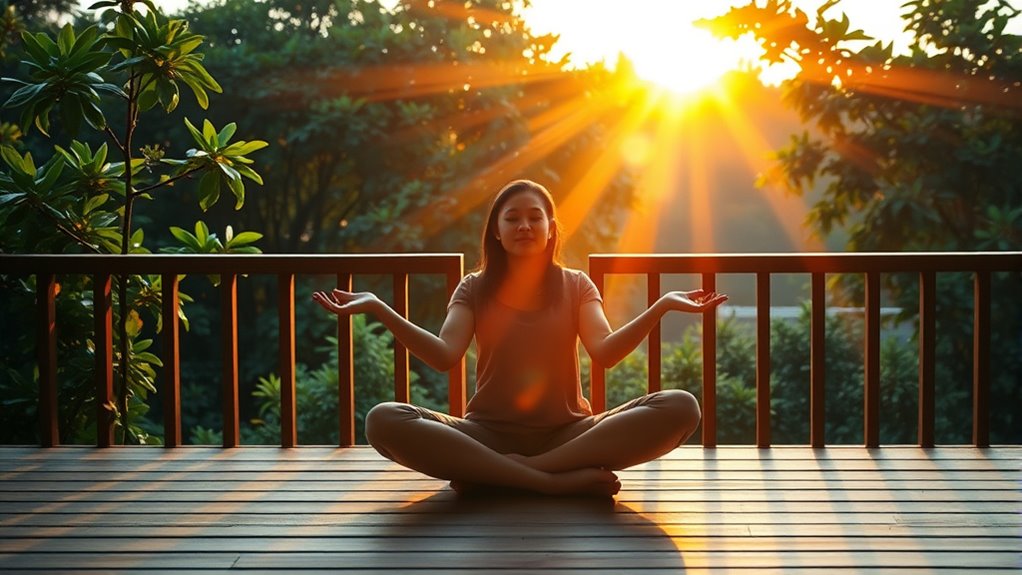Starting your day with exposure to natural morning sunlight can profoundly boost your mood, energy, and overall well-being. It helps regulate your internal sleep-wake cycle, balancing hormones like melatonin and serotonin for better sleep and greater emotional stability. Incorporate a few minutes outside or by your window shortly after waking to harness these benefits. Keep going, and you’ll discover more easy ways to make sunlight a powerful part of your morning routine.
Key Takeaways
- Step outside or open curtains soon after waking to maximize natural morning light exposure.
- Incorporate sunlight into your morning routine consistently to regulate your circadian rhythm.
- Use natural daylight instead of artificial lighting to boost mood and hormone balance.
- Combine morning light with gentle physical activity to enhance energy and emotional well-being.
- Make morning light a daily habit to improve sleep quality and reduce feelings of fatigue.

Starting your day with morning light rituals can considerably boost your mood, energy, and overall well-being. When you step outside or open your curtains shortly after waking, you’re giving your body a natural signal that it’s time to start the day. This exposure to natural light plays a vital role in regulating your circadian rhythm, the internal clock that controls your sleep-wake cycle. A well-synchronized circadian rhythm helps you fall asleep more easily at night and feel alert during the day. When your internal clock is aligned with the environment, you’re more likely to experience mood enhancement, feeling calmer and more positive throughout the day.
By intentionally immersing yourself in morning light, you help reset your circadian rhythm, which can be disrupted by artificial lighting, screen time, or irregular sleep schedules. This reset is essential because it influences the production of hormones like melatonin and serotonin, which directly impact your mood and energy levels. Melatonin, the sleep hormone, is suppressed by natural light, signaling your body that it’s time to wake up, while serotonin, linked to happiness and well-being, is increased through sunlight exposure. This hormonal balance fosters a sense of alertness and emotional stability, making it easier to handle daily stresses and setbacks.
The benefits of morning light go beyond just mood. When you get sunlight early in the day, your body’s biological processes are optimized, leading to better focus and productivity. Plus, the sun’s rays are a natural source of vitamin D, which has been linked to improved mood and immune health. Consistently incorporating morning light into your routine can help you establish a more regular sleep schedule, reducing feelings of fatigue and sluggishness. Over time, this consistency reinforces your circadian rhythm, making it easier to wake up feeling refreshed and ready to face the day. Additionally, exposure to natural light can help reduce the reliance on artificial lighting, which may disrupt your biological clock and affect your sleep quality.
Frequently Asked Questions
How Long Should I Spend Outside for Morning Light Exposure?
For ideal timing, aim for about 20 to 30 minutes of light exposure each morning. The perfect light duration helps reset your internal clock and boosts your mood, especially if you’re exposed to natural sunlight early in the day. You should spend this time outdoors, preferably within the first hour after sunrise, to maximize benefits and set a positive tone for your day.
Can Evening Light Exposure Affect My Sleep?
Your evening light exposure can dramatically disrupt your sleep, potentially throwing your circadian rhythms into chaos. Bright screens and artificial lights suppress melatonin, making it harder to fall asleep and stay asleep. Even just a few hours of exposure can delay your sleep cycle and reduce sleep quality. To protect your rest, dim your lights and avoid screens at least an hour before bed, helping your body naturally prepare for sleep.
Does Window Light Count for Morning Exposure?
Indoor lighting from windows can contribute to your morning light exposure, but it depends on window orientation. If your windows face east, they let in more natural morning light, which can help regulate your sleep cycle and boost mood. However, if your windows face west or north, the light may be weaker. To get the most benefit, spend time near windows during the morning, regardless of indoor lighting.
What if I Live in a Cloudy or Rainy Climate?
Imagine living in a cloudy city, where outdoor light is scarce. You can still enhance your mood with indoor lighting and light therapy devices, which simulate natural sunlight. For example, using a lightbox each morning helps regulate your circadian rhythm, even on rainy days. While window light may be limited, supplementing with light therapy ensures you get the benefits of morning exposure, supporting your mental health and energy levels.
Are There Specific Times to Maximize the Benefits?
Timing considerations are key to maximizing light exposure benefits, especially with seasonal variations. You should aim to get outside within the first hour after sunrise whenever possible, even on cloudy days, since morning light still helps regulate your circadian rhythm. If mornings are consistently overcast, consider using a light therapy box during the same time window. Adjust your routine based on seasonal changes to maintain consistent light exposure and support your mood.
Conclusion
Starting your day with morning light can markedly boost your mood and energy levels. Did you know that just 20 minutes of dawn exposure can improve your sleep and reduce depression symptoms? By incorporating these simple rituals, you’re not only beating the blues but also setting a positive tone for the day ahead. So, step outside tomorrow morning—your mind and body will thank you for it. Embrace the dawn and watch your outlook brighten!









